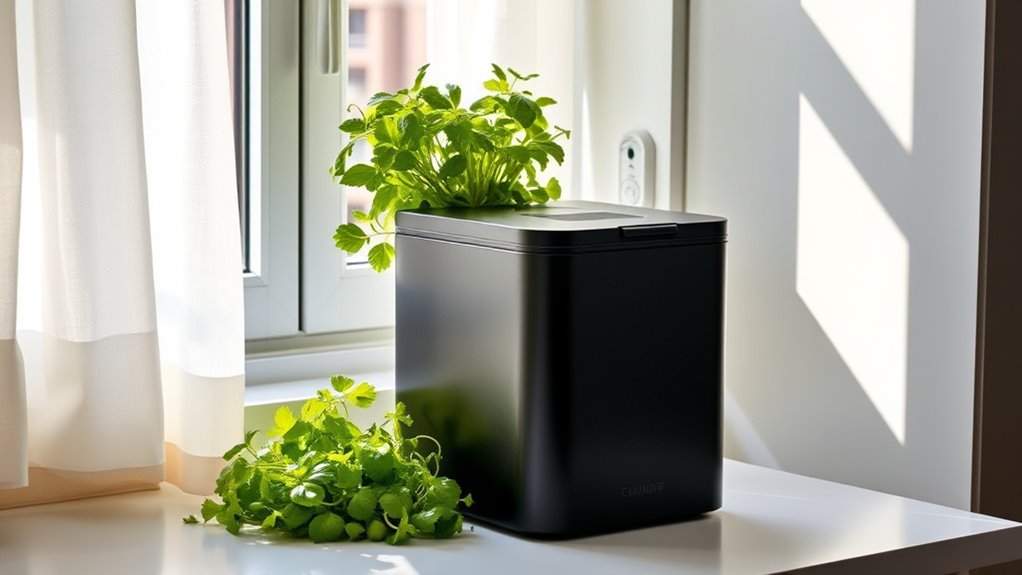To compost indoors without odors, place your bin in a well-ventilated spot near windows or exhaust fans, avoiding enclosed humid spaces. Layer brown, carbon-rich materials with green kitchen scraps, covering greens with dry materials to control moisture and smell. Regularly turn or mix your compost and use odor-absorbing filters or charcoal to keep odors at bay. Proper placement and maintenance make indoor composting odor-free—see how you can optimize your setup for great results.
Key Takeaways
- Place compost bins in well-ventilated areas near windows or exhaust fans to promote airflow.
- Layer dry carbon-rich materials over kitchen scraps to absorb odors and maintain moisture balance.
- Regularly turn or mix compost to aerate and prevent foul gases from developing.
- Use odor-sealed bins with charcoal filters for enhanced smell control inside apartments.
- Avoid enclosed, humid spaces like bathrooms; choose open or semi-open locations for composting.

Living in an apartment doesn’t mean you have to skip composting. In fact, with a little planning and some simple techniques, you can compost efficiently without worrying about unpleasant smells. The key is in how you choose your compost bin placement and the odor control techniques you implement. First, consider where you’ll put your compost bin. Ideally, it should be in a well-ventilated area, such as near a balcony, a laundry room, or a kitchen corner with good airflow. Avoid placing it in enclosed, humid spaces like bathrooms or closets, where odors can become trapped and more noticeable. If you have limited outdoor space, a small, odor-sealed bin inside your apartment can work, but be sure to position it near an open window or exhaust fan to help with ventilation. Proper placement helps prevent lingering smells from building up and makes maintenance easier.
Next, focus on odor control techniques to keep your composting experience fresh and odor-free. One of the most effective methods is layering your compost materials properly. Start with a layer of coarse carbon-rich materials like shredded newspaper, dry leaves, or cardboard at the bottom of your bin. This creates a dry base that absorbs excess moisture and promotes airflow. Then, add your kitchen scraps—fruit and vegetable peels, coffee grounds, eggshells—on top of this layer, and always cover these with a handful of dry material to reduce moisture and odor. Maintaining the right balance between brown (carbon-rich) and green (nitrogen-rich) materials is essential; too many greens can cause odors, while too many browns can slow down composting.
Regularly turning or mixing your compost also helps aerate it, preventing the buildup of foul gases. If your bin has a lid, use it consistently to contain smells. Some compost bins come with charcoal filters, which are excellent odor control techniques, absorbing smells and keeping your apartment smelling fresh. Draining excess moisture from the bin is equally important—if your compost is overly wet, it can produce unpleasant odors. Simply lift the lid and check moisture levels; if it’s soggy, add more dry materials or reduce green scraps.
Frequently Asked Questions
Can I Compost Dairy and Meat in an Apartment Setting?
You can compost dairy and meat in an apartment using indoor worm bins, but it’s tricky because these items can create composting odors. To prevent smells, bury dairy and meat deep in the bin, maintain a balanced mix of browns and greens, and keep the bin well-airated. Regularly freeze scraps until you’re ready to add them, which helps control odors and attracts worms, making composting easier and cleaner indoors.
How Often Should I Empty My Compost Bin?
You should empty your compost bin at least once a week to maintain proper compost bin maintenance and prevent odors. Regularly removing waste helps control odors, especially when using odor control methods like baking soda or activated charcoal. If you notice a strong smell before a week, empty it sooner. Keeping the bin dry, turning the compost regularly, and covering food scraps also help manage odors effectively.
What Is the Best Way to Prevent Fruit Fly Infestations?
To keep fruit flies at bay, you should focus on effective fruit fly prevention by using smart compost cover techniques. Always cover your compost with a layer of dry material like leaves or shredded paper, which acts as a barrier. Additionally, regularly empty and clean your bin, and keep the lid tightly closed. These simple steps will create an uninviting environment for fruit flies, ensuring your compost stays fresh and odor-free.
Are There Specific Composting Bins Designed for Small Apartments?
Yes, there are compact bins specifically designed for small apartments. You should look for one with built-in odor control features, like tight-fitting lids or charcoal filters. These bins help contain smells and keep your space fresh. Choose a size that fits your daily composting needs without taking up too much room. Regularly empty and clean the bin to prevent odors and maintain a clean, odor-free environment.
How Long Does It Take for Compost to Be Ready for Use?
Think of composting like brewing a good cup of coffee—timing matters. Usually, compost reaches maturity in 2 to 6 months, depending on your materials and conditions. During compost curing, you’ll notice it darkens and smells earthy. You can start using it once it’s fully cured and smells fresh, similar to a well-brewed coffee. Regular turning speeds up compost maturity and guarantees healthy, nutrient-rich soil for your plants.
Conclusion
By starting apartment composting without odors, you’re not only reducing waste but also contributing to a greener planet. Did you know that composting can cut your household waste by up to 30%? With simple tips like proper bin placement and moisture control, you can enjoy fresh compost without any unpleasant smells. Embrace this eco-friendly habit today—you’ll be amazed at how easy and rewarding it is to make a positive impact right from your apartment.









